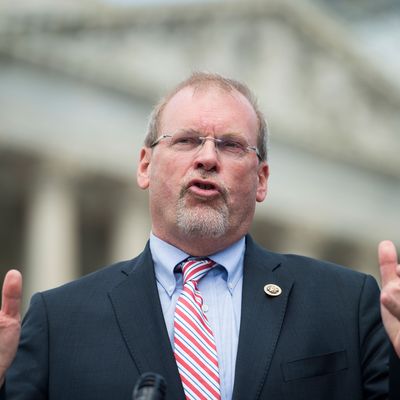
This week, congressional Republicans gave themselves the power to slash the annual salary of any individual federal worker to as low as $1 — and the budget of any individual federal program right down to zero.
They executed this attack on the independence of the civil service by reviving an obscure provision enacted by Congress in 1876: The Holman Rule, named after the Indiana congressman who devised it, empowers any member of Congress to submit an amendment to an appropriations bill that targets the funding of a specific government program or employee.
The rule was devised before the advent of a nonpolitical, career civil service and was rarely invoked in the modern era. In 1983, Democratic speaker Tip O’Neill laid it to rest. For the past three decades, Congress has had the power to slash any agency’s overall budget, but not to target specific projects or civil servants for funding cuts or downsizing.
Until now.
“This is a big rule change inside there that allows people to get at places they hadn’t before,” House Majority Leader Kevin McCarthy told reporters this week. “All agencies should be held accountable and tested in a manner and this is an avenue to allow them to do it.”
This big change flew under the radar when it was enacted Tuesday, as congressional Republicans’ (quickly forfeited) attempt to gut the House ethics office sucked up all available media attention. But the Holman Rule could prove more consequential, particularly if the GOP proves eager to deploy its new weapon.
Virginia congressman H. Morgan Griffith led the charge for reviving the Holman Rule, after learning about how much the federal government spends on the upkeep of wild horses ($80 million, apparently). When the Washington Post asked Griffith if the new rule would be used to cut “huge swaths” of the federal workforce, he replied, “I can’t tell you it won’t happen … The power is there. But isn’t that appropriate? Who runs this country, the people of the United States or the people on the people’s payroll?”
Here, Griffith elides the fact that those on “the people’s payroll” do not pursue programs born of their own individual whims, but rather, work to execute and enforce laws passed by the people’s duly elected representatives. (The House GOP may not approve of the Clean Air Act, but the Environmental Protection Agency does not undermine democracy when it works to enforce existing law.)
The rule appears most disconcerting when viewed in the context of the incoming administration’s apparent hostility toward the independence of the civil service.
Last month, Trump’s transition team sent the Department of Energy a questionnaire, which asked agency officials to list the names of employees and contractors who “had attended any” United Nations climate conferences “in the last five years,” worked on domestic efforts to limit carbon emissions, or “attended any Interagency Working Group meetings” to design the measurement known as the “social cost of carbon,” a metric often used by the Obama White House to justify its regulations of carbon output.
The team also requested a list of “which programs within DOE are essential to meeting the goals of President Obama’s Climate Action Plan.”
Trump eventually disavowed that questionnaire. But he has also named a series of cabinet nominees who are staunchly opposed to the missions of the departments they’re supposed to lead: The president-elect’s Labor Secretary–designate is a fast-food executive whose restaurants are serial violators of labor law; his EPA head is an ally of the oil industry who loves to sue the EPA; his head of Housing and Urban Development has called the Fair Housing Act “communist.”
If confirmed, these selections are bound to create tensions between the agency leadership and the career civil servants who’ve been tasked with executing laws that Republicans disapprove of, but which they lack the time, political will, and/or Senate votes to repeal.
But now, any civil servant whose climate research doesn’t produce the findings Scott Pruitt wants to see will, ostensibly, be at risk of having his or her job eliminated. For the next year, passing an amendment slashing an individual worker’s salary or position will require a simple majority in both houses of Congress. (In deference to intra-party opponents of the rule, Republicans have given it a 12-month expiration date.)
While present reporting suggests that House Republicans revived the Holman Rule on their own initiative, the move is of a piece with advice that Chris Christie provided to Donald Trump last summer.
In a recording obtained by Reuters, New Jersey’s giant reservoir of schadenfreude told a group of Republican donors that he had instructed Trump “to immediately ask the Republican Congress to change the civil service laws. Because if they do, it will make it a lot easier to fire” Obama appointees.
It remains unclear how aggressively Republicans will use the Holman Rule, which inspired some opposition within their own ranks. But the mere existence of the provision may be enough to advance its animating goal: The combination of the Holman Rule, hostile agency heads, rhetorical intimidation from the president-elect, and the Trump administration’s reported proposals for “reforming” the civil service — among them, an end to automatic raises and cuts to pension benefits — could very well inspire many conscientious, left-leaning bureaucrats to self-deport from the public sector.






























